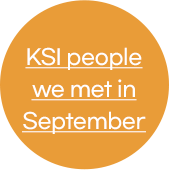
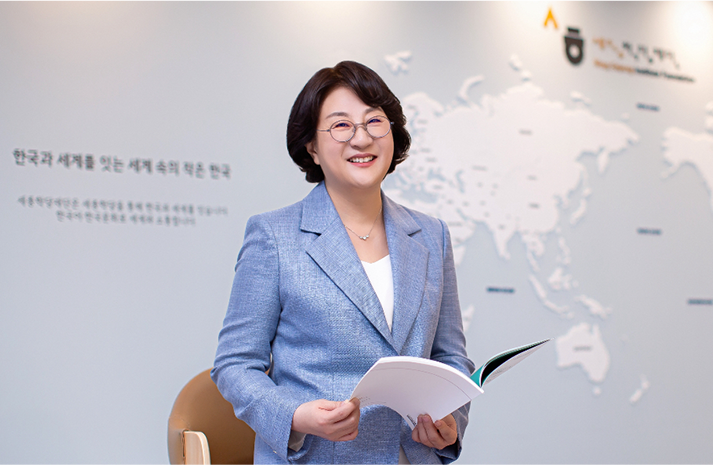
Meeting with President Lee Hai-young of the KSIF,
which has ushered in an era of 1 million
cumulative students for the KSI
President Lee Hai-young, who took office as President of the KSIF in September 2021, has led remarkable growth
over the past three years through the global expansion of the KSI and the introduction of an innovative Korean
language education system. Opening the era of 1 million cumulative students and leading innovations at key KSIs,
as well as the use of media in education, we met with President Lee Hai-young to hear about the achievements,
reflections, and future plans.
Hello, President Lee Hai-young. As you conclude your three-year term, could you share your thoughts on your
retirement?
Hello. It feels like just yesterday that I took office at the KSIF, and now I find myself delivering my final
farewell. I’ve always thought I wasn’t very aware of the passage of time, but after taking a deep breath and
opening my eyes, I realize how swiftly the time has flown by. When I look back, it feels like just yesterday
when I first took the initial step as KSIF’s President. I had no idea the time spent here would be so moving.
It’s been a continuous experience of emotion and inspiration.
What do you mean by “I had no idea it would be so moving?” Were there any particularly memorable moments?
Actually, every moment I spent at KSIF was special to me, but there are a few particularly memorable ones. The
first is meeting the inspiring individuals through KSI around the world. When I first met KSI's top learners, I
strongly felt that the time had come to diversify the goals of Korean language education. As I encountered these
global talents at KSI, and as we published the inaugural issue of the learners' casebook 〈Dream〉, I learned
about their various stories. It made me realize that KSI has added significant meaning to their lives. Seeing
our students start new challenges through KSI was truly inspiring. One learner said, “KSI is like a passport
that allows us to step into the world we dream of.” I remember feeling deeply moved when I heard those words.
Another particularly significant moment for me was the realization of media-based education, something I had
been interested in for a long time. The Metaverse KSI is the first permanent educational platform in the field
of Korean language education, offering a dynamic, practical, and living educational space. Last year, during
its first full year of operation, 75,000 people from 151 countries used the Metaverse KSI. In addition, the
iSKA, where the difficulty of questions adjusts based on the examinee's ability, was launched in 2024 as
Korea's first adaptive test, drawing significant attention. If we eventually integrate an automatic scoring
module, wouldn’t it be possible to have a fully AI-based assessment in the not-too-distant future? Just
thinking about it excites me. Thanks to these challenging experiences at KSIF, I've gained insights on how I
should nurture students and interact with the field when I return to Ewha Womans University. It’s been an
invaluable learning experience for the future.

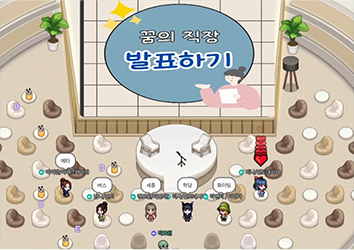
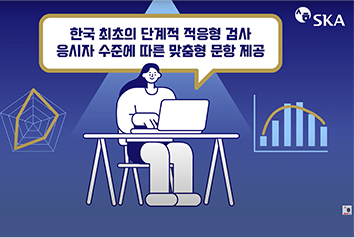
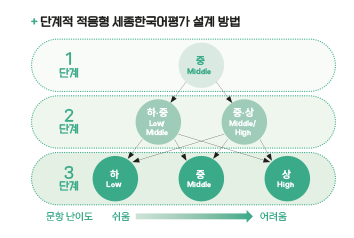
(First row) The Metaverse KSI, which began official operations in 2023, is an expansive virtual learning
space
where Korean language learners from all over the world can gather and communicate.
(Second row) The Sejong Korean Language Assessment Multi-Stage Adaptive test(iSKA), where the difficulty
of questions changes based on the examinee's Korean proficiency level
I heard you’ve also met some remarkable individuals at the regional KSI Centers that respond to the
characteristics and needs of learners in different areas.
Yes, that’s right. In November of last year, Jean-Marie Gustave Le Clézio, the French writer who won the 2008
Nobel Prize in Literature and was a visiting professor at Ewha Womans University, delivered a special message at
the opening ceremony of KSI Center France. During this event, which had over 100 attendees from 13 countries, he
mentioned King Sejong and the KSIF. His compelling communication style and his profound knowledge and love for
Hangeul left a lasting impression on me. I’ll never forget that moment. Interestingly, it’s said that Le Clézio
is known for declining invitations from heads of state, so the fact that we could invite such a distinguished
literary figure to the KSI Center France event and hear his message was personally meaningful for me.
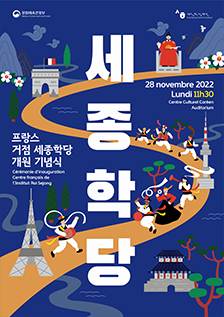
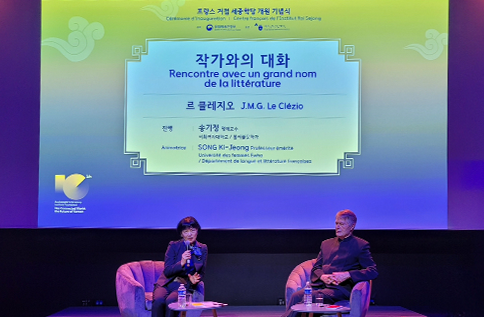
(Left photo) Poster for the opening ceremony of the KSI Center France
(Right photo) Jean-Marie Gustave Le Clézio, Nobel Prize in Literature laureate and French novelist,
delivering
a special lecture at the opening ceremony of the KSI Center France
Additionally, meeting the princesses and princes of Sharjah in the United Arab Emirates, which UNESCO has
designated as the Capital of Arab Culture, was also a delightful memory. They shared the story of the Arab
geographer Al-Idrisi, who drew a map 1,000 years ago that included Silla, the “Golden Country” known for its
beautiful mountains and pleasant natural environment. Their passion for reviving the forgotten cultural
exchanges between our two countries was truly inspiring. Establishing KSI through collaboration with the Arab
government institutions is something I could not have experienced had I not been the President of KSIF. Every
moment of reconnecting with these treasured individuals through KSIF and promoting King Sejong, the teacher of
our nation, as a teacher for the world, was a truly joyful experience.
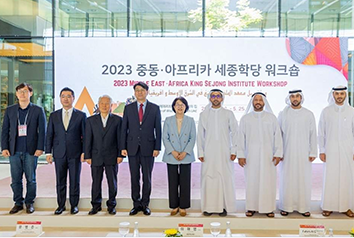
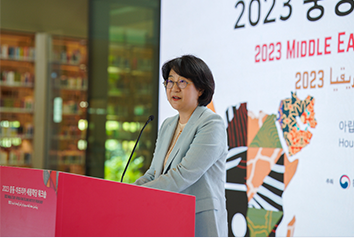
(Left photo) Signing of the Memorandum of Understanding (MOU) for the establishment of the KSI Center
Sharjah at the ‘2023 Middle East and Africa KSI Workshop’
(Right photo) President Lee Hai-young delivering the opening remarks at the ‘2023 Middle East and Africa KSI
Workshop’
Over the past three years, many new initiatives have been undertaken by the KSIF. Looking back on KSIF's major
growth and achievements during this time, were there any particularly meaningful moments or accomplishments
that stand out to you personally?
Yes, I believe KSIF has experienced significant growth and many changes. To name a few, the first is the
explosive increase in the number of learners at the KSI. Since its opening, the cumulative number of learners
has reached 1 million. I feel a sense of pride that KSIF has successfully played its role as a platform for
sharing and exchanging Korean language and culture.
There have also been interesting changes in learning demand over the years. The second achievement is related to
this shift in demand. KSI learners are no longer just cultural consumers, but are now stepping up as producers
and, further, as experts in Korean culture. We have witnessed global talents from KSI rise to become professors,
researchers, educational administrators, interpreters, translators, diplomats stationed in Korea, broadcasters,
and members of Korean companies. Remarkably, some have even gone on to master traditional Korean cultural arts,
becoming pansori singers or certified performers of Gyeonggi folk songs. In light of their fresh challenges,
KSIF launched the exemplary learner casebook 〈Dream〉 last year, and we held gatherings that linked these
learners with corporate and university scholarship sponsors to help support their dreams. Finally, Kyung Dong
Navien and other companies with a shared vision began scholarship sponsorships for outstanding KSI learners,
and many university presidents in Korea provided scholarship support for degree programs.
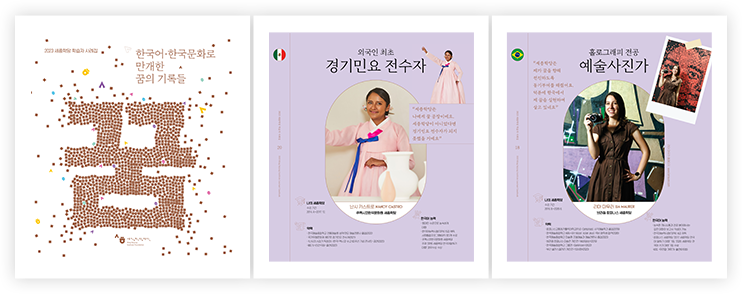 KSI learners who have transitioned from being consumers to producers of Hallyu culture are featured in the
KSI learners who have transitioned from being consumers to producers of Hallyu culture are featured in the
KSI learner casebook 〈Dream〉
Thirdly, a major change has occurred at regional KSI centers. When I first joined KSIF, the role of these
regional KSI centers was similar to that of regular KSIs, focusing solely on education. We concluded that this
approach was not cost-effective and did not align with the goals of establishing the regional KSI centers. After
difficult decisions and discussions, we transformed the regional KSI centers into local headquarters that could
identify and support local education needs. KSI Center Vietnam, for example, started producing and broadcasting
a Korean language education program in collaboration with Vietnam’s national broadcaster VTV7. KSI Center France
also developed a meaningful program. As part of a program tailored to the culturally sensitive citizens of
Paris, participants experienced the beauty of Hanji (traditional Korean paper) by making the official flower of
the 2024 Paris Olympics, the red dahlia. Through this activity, we hope to see Hanji become recognized as a
UNESCO Intangible Cultural Heritage, allowing people around the world to enjoy Hanji culture together.
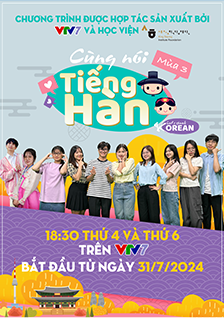
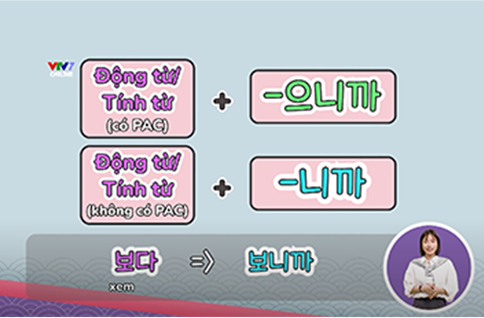
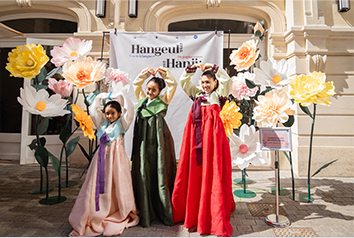
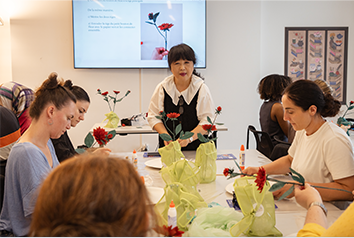
(First row) 〈Speak in Korean!〉, a Korean language education program produced in collaboration between
KSI Center Vietnam and Vietnam's national broadcaster VTV7
(Second row) Participants in the Hanji craft workshop held at KSI Center France, creating the official flower
of
the 2024 Paris Olympics, the red dahlia, using Hanji
When I joined KSIF, I also believed that proactive and aggressive promotion was crucial. KSIF had relatively
weak publicity compared to other public institutions. To address this, I wrote over 20 columns for external
media and appeared on broadcasts to raise KSIF’s profile. It wasn’t easy for someone like me, who had only
written academic papers, to write a column every Tuesday and submit it, but seeing people reach out after
reading the columns or watching the broadcasts made me realize that the promotional efforts were quite
effective. In hindsight, I believe it was the right decision. Additionally, we promoted KSIF through the KBS
program Our Language Challenge, as well as through public broadcast appearances by KSI graduates who became
pansori singers, Gyeonggi folk song performers, and professional YouTubers. We also worked with well-known
foreign YouTubers and influencers to increase awareness of the KSI. In 2022, for the first time, we appointed
foreigners as KSIF’s promotional ambassadors, including Lucky from India, Alberto from Italy, and Daniel from
Germany. These foreign ambassadors are actively promoting KSI through various domestic and international
activities. A short-form video we shot with them last year hit 1 million views within a week of being uploaded,
showing the substantial impact of our efforts.
A scene from Global Our Language Challenge, a program co-planned by KSIF and KBS, For the first time in the
20-year history of KBS Our Language Challenge, overseas filming was conducted at four KSI locations to
commemorate the anniversary.
(Left photo) A poster for the KSIF web variety show 〈Short-form Battles! Everyone’s K-Culture〉,
featuring the three foreign promotional ambassadors (Alberto, Daniel, and Lucky)
(Right photo) A commemorative photo taken with the cast,
including President Lee Hai-young (third from the left), after the production press conference
Lastly, what I want to mention is not exactly an achievement, but rather a cherished memory—it's about the
people I saw. By making support available for each institute, restoring the rights of teachers, emphasizing
responsibility and collaboration in teacher training courses, and strengthening the partnership between KSIF
staff and dispatched teachers, it all came down to seeing people. The same goes for highlighting the importance
of local teachers, starting consultations to design a sustainable future for Korean language education, and
acknowledging the people working on the ground overseas. We began educating adoptees and developed the “KSI
Font,” a Hangeul font made available for download overseas, which can be challenging to access. These were all
done because we saw the people behind these efforts. Above all, the memories of writing birthday cards by hand
for our staff, having lunch with them on their birthdays, and feeling like family with them are memories that
will remain in my heart. In fact, according to MBTI, I’m considered a strong “T” (Thinking type), but when KSIF
family said they saw me as an “F” (Feeling type), that emotional recognition was something I won’t forget. It’s
the kind of life that a “T” like me dreams of, honestly.
Three years ago, when you were appointed, you said, “I hope the KSI will become our ‘pride itself’.” Do you
feel that this has been realized as you had hoped?
At the time of my appointment, I felt that while KSI was widely recognized abroad, it was less well-known
domestically, which is why I made that statement. In that sense, I think we have certainly achieved what I hoped
for. Perhaps thanks to our aggressive promotional efforts, more people became aware of our KSI students through
broadcasts, and the public started to feel pride as well. I hope that moving forward, people will continue to
take pride in the fact that we have such a wonderful platform for exchanging Korean language and culture here in
our country, and that there are foreigners around the world who deeply love the Korean language and culture. I
also heard directly from the young staff members at KSIF and the KSI learners I’ve met that they feel pride when
they think of our institute. Hearing that personally was truly heartwarming. Now, I believe KSI has become our
pride.
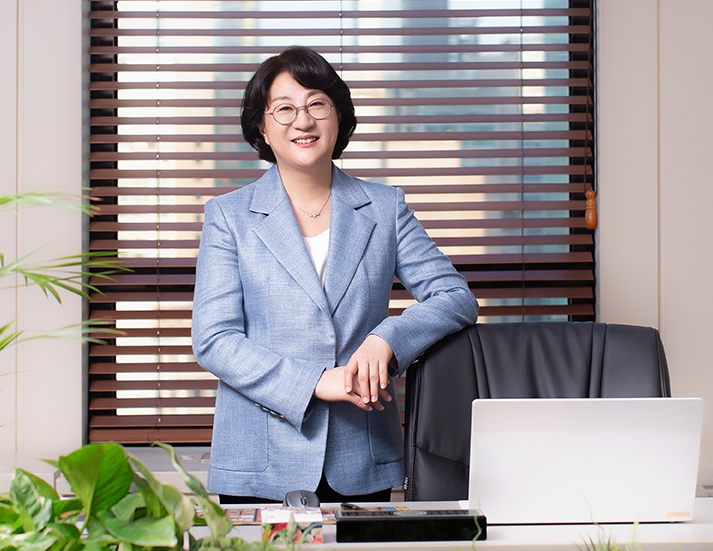
What has been the driving force behind the remarkable growth of KSIF over the past three years under your
leadership?
People often say that I am blessed with “good fortune in relationships.” There are many types of fortune, such
as wealth, academic ability, and health, but I believe my fortune lies in the relationships I’ve built. I dare
say that this unique fortune in relationships has been the greatest driving force behind the growth of KSIF.
There are many people at KSIF who have always believed in me and been active supporters. The unforgettable
source of my strength has been KSIF's family, who have always cheered me on with warm hearts. I think their
presence has been the wellspring of my strength. In particular, I would like to express my gratitude through
this interview to Secretary General Bae Jong-min of KSIF, who has been a tremendous source of support for me,
and to Director Lee Hae-don of the Ministry of Culture, Sports, and Tourism, who has provided steadfast
assistance. Secretary General Bae has extensive experience as a civil servant, and his experience and wisdom
have been another valuable learning opportunity for me. He’s the one who taught me about detours, when all I
knew was moving straight ahead. Director Lee Hae-don, with his warm and meticulous leadership, has made me feel
a strong sense of belonging, always saying I could reach out whenever KSIF needed support from the Ministry. His
solid and generous support has greatly influenced the direction of KSIF's projects. At the end of September,
KSIF relocated to the Arirang International Broadcasting (Arirang TV) building, and this too was made possible
thanks to the decisive support from Director Lee. As a result, KSIF has been able to reduce operational costs
and even gained a prominent signboard for greater visibility.
Before becoming the President of KSIF, you served as a professor in the Department of Korean Studies at Ewha
Womans University and were involved in various activities related to Korean language education as an expert in
the field. What are your plans after stepping down?
Now, with a new sense of excitement, I will return to my original position as a professor to resume my duties. I
was appointed as a professor in 2000, and I was the first to be hired under the official title of “Korean
Language Education.” When I calculate the time between my appointment and retirement, I realize I was given
approximately 30 years, and I have already passed 20 of them. Looking back, the first decade was a time of trial
and error as I worked to establish the department, create a Ph.D. program, and triple the number of specialized
professors. The next decade was spent serving the university in various roles, including Dean of the Graduate
School of International Studies, Director of the Language Education Institute, Director of the Korean Cultural
Center, and Director of International Affairs. Now that I am returning to the university, I want to dedicate the
remaining time to training and supporting overseas experts.
Currently, in the field of Korean language education abroad, education is prioritized over research. For both
students and teachers, Korean language remains a short-term goal limited to practical needs on the ground. To
achieve sustainable growth in Korean language education overseas, we need to strengthen the research base. We
need more professors who not only focus on teaching but also conduct research on the Korean language and Korean
language education. Their students, in turn, should be able to spread out to various schools and educate future
Korean language teachers, establishing a systematic approach.
So, I plan to concentrate on supporting these efforts moving forward. In fact, three years ago, I was involved
in teaching research methods and statistics to foreign professors and guiding them on how to utilize media in
their teaching, all with the aim of enhancing their research capabilities. Then, I came to serve as the
President of KSIF. After returning, I plan to resume this work. My final goal is to help Korean language
education gain professional recognition and establish itself abroad.
Lastly, would you like to share any thoughts on the direction in which KSIF should move forward? Or perhaps
any messages for domestic and international partners, as well as KSI learners and teachers worldwide?
KSIF must continue contributing not only through collaborations with new, virtuous companies but also by
promoting the widespread dissemination of the Korean language and culture. Additionally, we need to focus on
bridging secondary and higher education, while continuing efforts to support the sustainability of local
education systems abroad by training local teachers and fostering the private sector ecosystem.
I believe KSIF has the DNA that enables it to discover new learning demands and embrace growth without fear. By
leveraging platforms like iSKA, the metaverse, and AI, we will continue driving innovation in Korean language
education. I hope that our teachers feel a deep sense of pride and experience both responsibility and
fulfillment in their daily work, reflecting the identity of KSIF, which has long led the field of Korean
language education. Moreover, I wish for all KSIF’s staff, who play a crucial role in strengthening our overseas
presence, to continue their strong progress with a sense of accomplishment and mission, discovering and dreaming
of the future as they bring about change.
To all KSI learners around the world, your fresh challenges remind me of Helen Keller’s words: “Life is either a
daring adventure or nothing at all.” Many of you have compared KSI to a “passport to the land of dreams,” and I
will always be cheering on your bold and determined journeys.